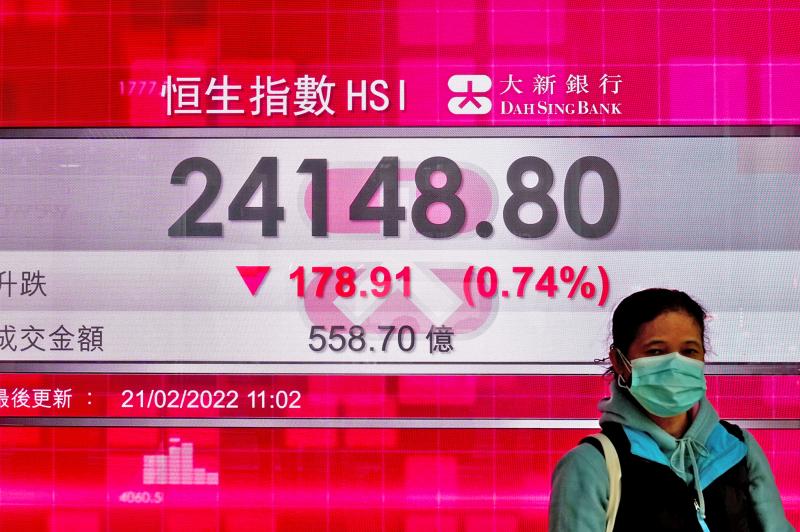Most companies that sold shares for the first time in Hong Kong this year have had to accept pricing at the low end of their expected range.
Tough conditions for first-time issuers globally — ranging from the prospect of higher interest rates to heightened geopolitical tensions — have added to local concerns in the territory since the middle of last year, as China tightened its grip for issuers abroad.
The increased risks are becoming evident deal after deal.

Photo: AP
Just six companies priced shares in Hong Kong this year, with five of them settling at the bottom of their marketed range, data compiled by Bloomberg showed.
The initial weeks of last year and this show starkly different conditions, with investors becoming more selective.
Pricing of fewer than one-third of the 19 initial public offerings (IPOs) that Hong Kong hosted during the same period last year fell at the lower end of the range.
The erosion in sentiment has extended to trading, with three of those shares that have already debuted changing hands a price lower than their listing. That contrasts with a 3 percent year-to-date gain for the Hang Seng Index, which is recovering from a 14 percent annual slump.
The trend would continue as long as there is a mismatch between valuations issuers expect and what investors consider the assets deserve, said Brian Freitas, an analyst on independent research platform Smartkarma.
Some IPOs had large cornerstone investor allocations, he added, indicating that “the broader market did not participate.”
“To get past this trend, issuers will need to lower their valuation expectations and their IPO prices, and then the IPOs will need to trade higher post-listing to build confidence that the issuers are leaving something on the table for investors,” Freitas said.
Separately, JPMorgan Chase & Co’s Ryan Holsheimer, head of cash equity and equity distribution for Asia-Pacific, is leaving Hong Kong after seven years with the firm, adding to a string of senior departures and relocations from the territory.
Holsheimer, 47, is to return to Australia to rejoin his family, and would be succeeded by Sara Perring, currently the head of cash equity distribution in Japan, who would relocate to Hong Kong, an internal memo confirmed by a spokesman said.
The lender has also shifted a number of other managing directors from Hong Kong in the past six months, primarily to Europe.
The personnel moves span equities, trading and investment banking, with some taking a step up to oversee a bigger region, people familiar with the matter said.
Hong Kong’s financial community is in the midst of an upheaval as the territory’s pursuit of “zero COVID-19” over the past two years has strained operations and damped the once bustling territory.
Business groups have warned that Hong Kong is facing an exodus of foreign talent because of strict quarantine policies that make travel in and out of the territory a near impossibility for dealmakers.
The territory is tightening up further to halt its biggest outbreak since the COVID-19 pandemic began.

SEEKING CLARITY: Washington should not adopt measures that create uncertainties for ‘existing semiconductor investments,’ TSMC said referring to its US$165 billion in the US Taiwan Semiconductor Manufacturing Co (TSMC, 台積電) told the US that any future tariffs on Taiwanese semiconductors could reduce demand for chips and derail its pledge to increase its investment in Arizona. “New import restrictions could jeopardize current US leadership in the competitive technology industry and create uncertainties for many committed semiconductor capital projects in the US, including TSMC Arizona’s significant investment plan in Phoenix,” the chipmaker wrote in a letter to the US Department of Commerce. TSMC issued the warning in response to a solicitation for comments by the department on a possible tariff on semiconductor imports by US President Donald Trump’s

‘FAILED EXPORT CONTROLS’: Jensen Huang said that Washington should maximize the speed of AI diffusion, because not doing so would give competitors an advantage Nvidia Corp cofounder and chief executive officer Jensen Huang (黃仁勳) yesterday criticized the US government’s restrictions on exports of artificial intelligence (AI) chips to China, saying that the policy was a failure and would only spur China to accelerate AI development. The export controls gave China the spirit, motivation and government support to accelerate AI development, Huang told reporters at the Computex trade show in Taipei. The competition in China is already intense, given its strong software capabilities, extensive technology ecosystems and work efficiency, he said. “All in all, the export controls were a failure. The facts would suggest it,” he said. “The US

The government has launched a three-pronged strategy to attract local and international talent, aiming to position Taiwan as a new global hub following Nvidia Corp’s announcement that it has chosen Taipei as the site of its Taiwan headquarters. Nvidia cofounder and CEO Jensen Huang (黃仁勳) on Monday last week announced during his keynote speech at the Computex trade show in Taipei that the Nvidia Constellation, the company’s planned Taiwan headquarters, would be located in the Beitou-Shilin Technology Park (北投士林科技園區) in Taipei. Huang’s decision to establish a base in Taiwan is “primarily due to Taiwan’s talent pool and its strength in the semiconductor

French President Emmanuel Macron has expressed gratitude to Hon Hai Precision Industry Co (鴻海精密) for its plan to invest approximately 250 million euros (US$278 million) in a joint venture in France focused on the semiconductor and space industries. On his official X account on Tuesday, Macron thanked Hon Hai, also known globally as Foxconn Technology Group (富士康科技集團), for its investment projects announced at Choose France, a flagship economic summit held on Monday to attract foreign investment. In the post, Macron included a GIF displaying the national flag of the Republic of China (Taiwan), as he did for other foreign investors, including China-based